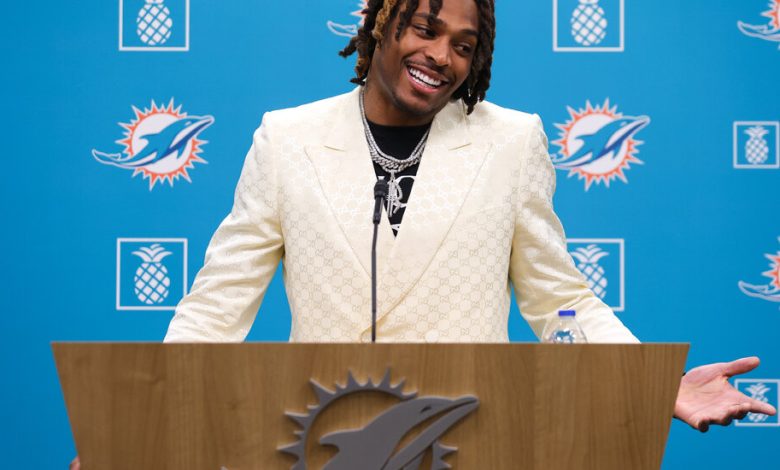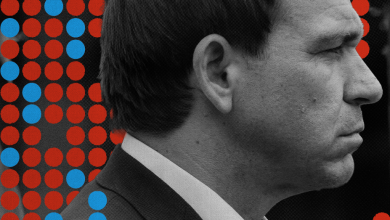N.F.L. Teams Are Bullish on Cornerbacks and Bearish on Running Backs

The trade talks/ransom negotiations over Aaron Rodgers between the Jets and the Green Bay Packers, coupled with the icy contractual staring contest between Lamar Jackson and the Baltimore Ravens, have so thoroughly dominated the N.F.L. news cycle that it is easy to lose track of the dozens of trades, signings and releases that have taken place since the official start of the league’s new year on March 15.
Most of the transactions boil down to a frenzied blur of sturdy, but unspectacular, veterans signing fully unguaranteed contracts. These deals will not affect the 2023 standings much. Some of the comings and goings of the free-agency period, however, are signs of larger trends that are reshaping how teams structure their rosters and payrolls.
Bargains on the Trading Block
The shrewdest maneuvers have been trades, not free-agent signings. Veterans on the trading block are often better players than the available free agents and can be acquired in exchange for midround draft picks and affordably replaced in a year or two, if things don’t work out.
The Miami Dolphins strolled into the Los Angeles Rams’ salary-cap-mandated sheriff’s auction and came away with the services of a six-time Pro Bowl cornerback, Jalen Ramsey, for just a third-round draft pick and the rights to a backup tight end, Hunter Long. The Dolphins acquired an outstanding defender in his prime; the Rams settled for some spare parts and $5.6 million in sweet cap relief.
The Dallas Cowboys acquired the rights to a five-time Pro Bowl cornerback, Stephon Gilmore, from the Indianapolis Colts for just a fifth-round pick, then traded two late-round picks for the much-traveled receiver Brandin Cooks, who did not fit the Houston Texans’ rebuilding plans. Technically, the Cowboys were inactive on the free-agent market, yet they added two quality starters.
The Texans acquired the rights to guard Shaq Mason from the Tampa Bay Buccaneers, who are downsizing in the wake of Tom Brady’s latest and most credible retirement announcement. All the Buccaneers received in return for an eight-year starter with two Super Bowl rings was a reshuffling of late-round draft picks.
The Giants got into the act by trading a third-round pick for the rights to tight end Darren Waller, a 2020 Pro Bowl player with the Las Vegas Raiders, who do not appear to know whether they are contending or rebuilding right now.
Also of note: The Jets added safety Chuck Clark, formerly of the Ravens, in exchange for a mere seventh-round pick, illustrating that it’s possible for a team devoting most of its resources and bandwidth to acquiring/courting/appeasing Rodgers to make upgrades, just not very big ones.
No-Fly Zones Strictly Enforced
Fielding just one quality cornerback in today’s N.F.L. is about as useful as wearing one roller skate. Teams need bundles of two or three capable cornerbacks to stop the full-throttle passing games of the Kansas City Chiefs, Philadelphia Eagles and Cincinnati Bengals. That’s why the Dolphins added Ramsey to pair with the four-time Pro Bowler Xavien Howard and the Cowboys acquired Gilmore to join Trevon Diggs, the 2021 interceptions leader.
Other teams also invested heavily in their secondaries. The Detroit Lions added cornerbacks Cameron Sutton (formerly of the Pittsburgh Steelers) and Emmanuel Moseley (San Francisco 49ers), plus Eagles safety C.J. Gardner-Johnson, in a bid to make the leap from feisty also-rans to legitimate contenders. The Eagles, desperate not to backslide after their Super Bowl loss, lost Gardner-Johnson but managed to retain both James Bradberry and Darius Slay, at considerable expense.
Not every contender managed to keep its pass defense intact. The Bengals lost their starting safeties Jessie Bates (Atlanta Falcons) and Vonn Bell (Carolina Panthers). Bengals games may be higher scoring than N.B.A. games in 2023.
For Sale: Running Back Cleats. Overused.
While cornerbacks and safeties are in greater demand than ever, running backs have joined the gig economy.
Saquon Barkley (Giants), Josh Jacobs (Raiders) and Tony Pollard (Cowboys) received franchise tags and $10.1 million each from their clubs: a living wage, certainly, but hardly a commitment. Running backs who changed teams in search of fulfilling long-term relationships ended up taking what they could get.
Miles Sanders, who rushed for 1,269 yards for the Eagles last season, signed with the Panthers for a reported four-year deal that includes just $13 million guaranteed. Jamaal Williams, who rushed for 1,066 yards and a league-high 17 touchdowns for the Lions in 2022, signed with the New Orleans Saints for three years and just $8.15 million in guarantees.
Meanwhile, Los Angeles Chargers running back Austin Ekeler formally requested a trade, and there have been loud rumors that perennial 1,000-yard rushers like Dalvin Cook and even Derrick Henry were on the block. No one appears to be in any hurry to take on these high-mileage rushers.
The most stunning development on the running back job market, however, was the Cowboys’ release of the two-time N.F.L. rushing leader Ezekiel Elliott, who had reached the tail end of the increasingly burdensome $90 million contract extension he signed in 2019.
The Cowboys will now incur $11.8 million in dead money while handing the bulk of their carries to Pollard, and Elliott-sized running back contracts have most likely gone the way of the Stegosaurus.
Have Clipboard, Will Travel
“Bridge quarterback” remains one of the safest careers in America: Veteran passers with meager accomplishments but an air of professionalism can enjoy long, lucrative careers as backups and traveling private tutors for incoming rookies.
Andy Dalton signed with the Panthers, his fifth team in the last five seasons, to serve as a sort of adjunct professor for whichever quarterback the team selects with the first pick in April’s draft. The Texans added the much-traveled Case Keenum to help with the care and feeding of their anticipated rookie addition. The Colts signed Gardner Minshew, whose persona is less “dutiful homework helper” and more “older brother who bought beer for your postprom rager,” to impart his unique life lessons on some impressionable quarterback of the future.
A bridge quarterback can also help an indecisive team keep its options open. The former Washington Commanders quarterback Taylor Heinicke is now in Atlanta, where he may challenge/tutor the incumbent, Desmond Ridder, or a draft acquisition. Did the Commanders sign Jacoby Brissett as their new starter, as a challenger for the second-year pro Sam Howell or as a mentor for an incoming rookie? We may not know until Dan Snyder has sold the team and sailed off to his volcanic island lair.
One thing is certain: Teams signing bridge quarterbacks like Dalton and Brissett are tacitly excusing themselves from all Rodgers, Jackson and maybe-not-retired Brady conversations. In some ways, that makes them the lucky ones.




